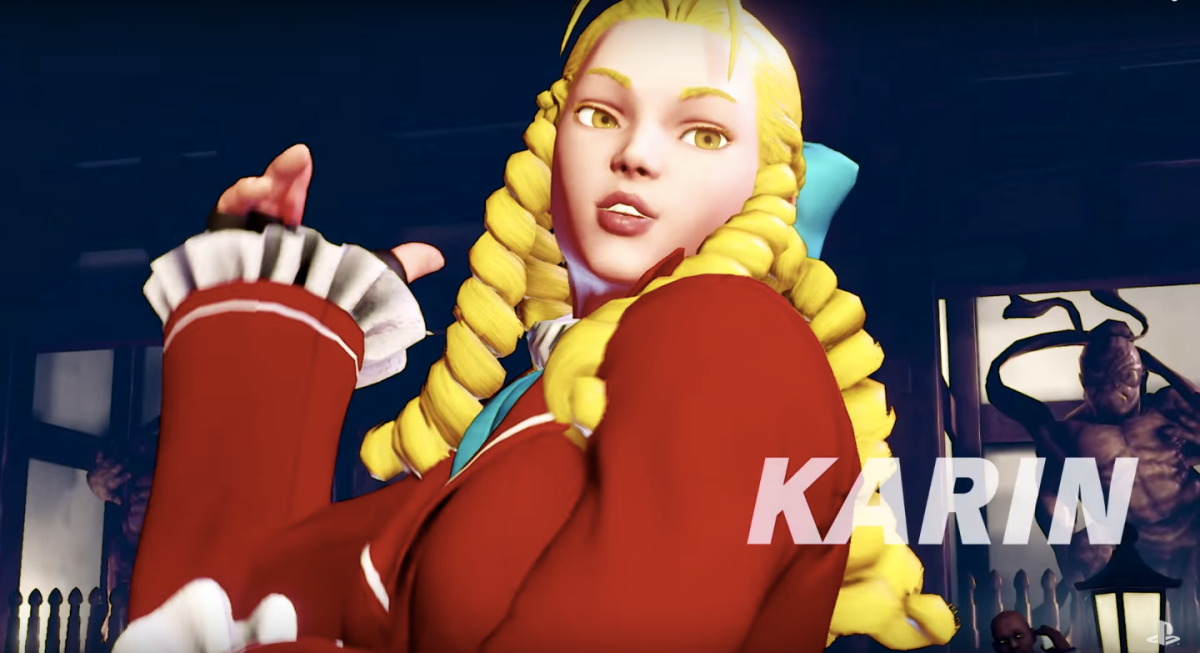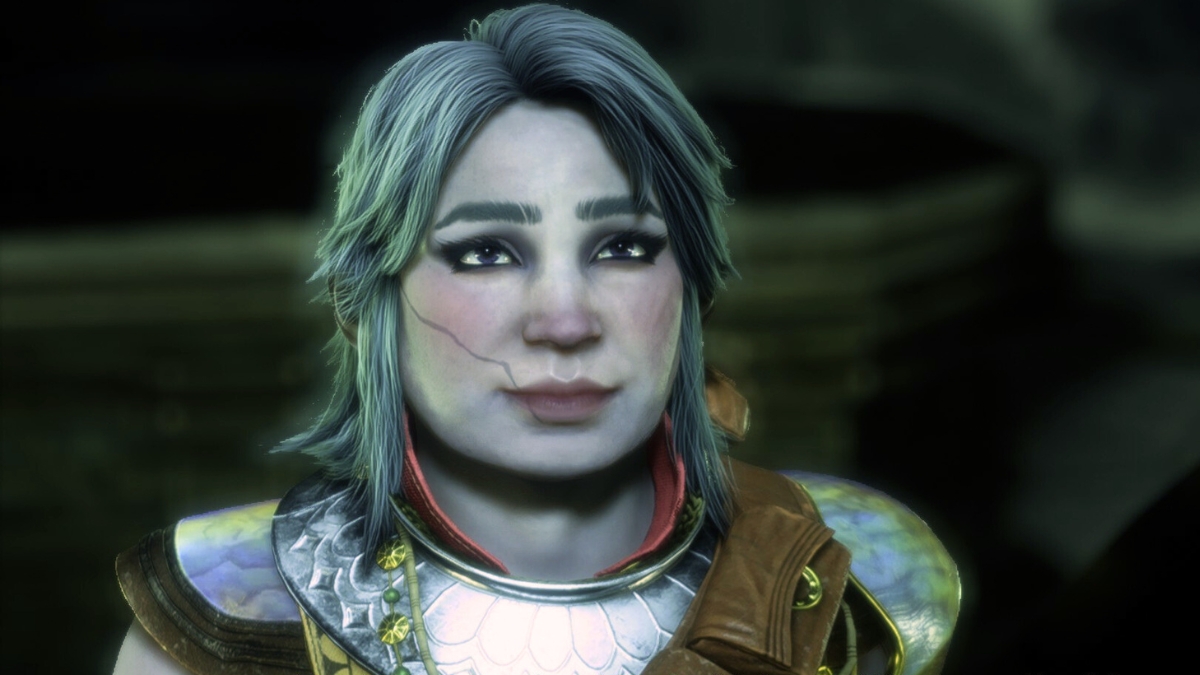The latest addition to the exclusive Street Fighter V roster is Karin, rival of fellow schoolgirl Sakura; Sakura has yet to be announced and may not even appear in SFV, but her frenemy Karin has been a fan favorite since her appearance in the SF Alpha series, from whence fellow SFV fighter R. Mika also hails. SFV is shaping up to be a real Alpha reunion, eh?
In terms of narrative framing, Karin is like the Ken to Sakura’s Ryu, but unlike those other three characters, Karin’s got a slightly different move-set; she doesn’t use projectiles, and as you can see from the video, her style’s a little more hands-on and in-your-face. (Fans often refer to her as a “Rekka” character type, after Fei-Long; Ryu, Ken, and Sakura are “Shotokan” types.)
But let’s return to narrative framing for a moment. As Street Fighter fans know, Sakura represents innocence and purity; it’s not just that she’s named for the cherry blossom, it’s also her schoolgirl look and her perky one-liners. Perhaps the most notable difference between Sakura and Karin at first glance is their hairstyle (Karin’s got aristocratic blonde ringlets) and the fact that Karin wears a pair of bicycle shorts underneath her school uniform. As of SFV, Karin wears a pair of opaque black leggings with her uniform, and she’s also left behind her previous sailor-inspired uniform in favor of a more Victorian collar and cuffs. She looks more grown-up, in order words, and also slightly more conservative.
Since I’ve been recently defining how objectification works in fighting games, specifically sexual objectification, and using Street Fighter as my example, I feel obligated to point out how Karin’s introductory trailer serves as a great example in how this works.
Each character’s SFV announcement trailer has followed a similar pattern: it’ll begin with a six-second look at the character’s costume and perhaps give them one line or an opportunity to emit a foreboding laugh. After that, we’ll get about a minute of gameplay, concluding with use of the V-Trigger and Special move, which often involves a slow-pan over the character once more and another opportunity for either a one-liner or similar character-building moment. As I’ve explained previously, these tiny moments are the only opportunities the developers have to let us get to know these characters and connect with them; they must be masters of “show don’t tell,” revealing a lot of context in precious little time.
In Karin’s introductory six seconds, we see her ankle boots, then we get a lengthy slow pan up her backside as she slowly walks towards her opponent. We get a lingering glimpse at the ruffles of the back of her skirt bouncing up and down over her opaque black stockings. Then, we get another slow pan up her body from the front side, centering her breasts in the shot; again, although she is dressed conservatively, it’s worth noting that the camera chooses to focus on her backside and chest right off the bat, before ending on her face.
Contrast this with Ken’s announcement trailer; unlike Karin, he only gets five seconds of intro. The first shot focuses on his clenched fist in front of his chest; the next centers his crotch in the shot, but unlike Karin, Ken is performing a warm-up fighting move during both of these sequences. The movement of his body de-emphasizes his crotch, butt, and chest, which are parts of his body that could theoretically be presented as sexual by the camera, but are not framed as such. As in Karin’s trailer, Ken’s face is the last thing revealed, but his movements up until that point are very different and framed in a different way.
As another example, let’s look at Vega’s announcement trailer; he’s got a low-cut shirt, but throughout his trailer, he also performs action moves, rather than just a slow walk. There are a couple of brief moments when his bare chest is centered in the shot, but there is no slow-pan up his body — and certainly not a slow pan of his butt, crotch or chest.
I could go on, but I’m not sure I need to; I watched all of the announcement trailers over again in preparation for writing this article, and Ken and Vega’s were (in my opinion) the only two examples of male characters who might arguably be sexually objectified by the camera’s framing. I welcome you to watch them as well and notice the differences in how each character is presented in such a short time period.
I have had folks point out to me, in an attempt to be helpful, that Karin is “at least” wearing opaque stockings now, which is presumed to be “better” than the bicycle shorts she wore before. No offense meant to these folks, but that frankly matters not a jot to me. Bicycle shorts are great, first of all. They’re practical for fighting, they’re comfortable, and what’s more, it’d be cool to live in a world where female skin isn’t seen as inherently inappropriate or sexual. The problem has always been the camera’s framing (and also the narrative framing of the female characters), and as I’ve pointed out above, Karin wearing a pair of tights doesn’t seem to have changed the camera’s behavior here.
As for the narrative framing, I think Karin and Sakura’s rivalry has a lot of potential as a story-line that could return (especially if Sakura comes back for SFV as well, fingers crossed). Although Karin comes across as a straightforward ojou character type, complete with a Noblewoman’s Laugh, I think it’s rad to see a young girl sneering down her nose at physically formidable opponents like M. Bison. Speaking of how young she is … well, Karin doesn’t have a known age, but it looks like she may have aged out of the schoolgirl uniform, since some years have gone by canonically since SF Alpha 3. That means we may get to see an older version of Sakura as well. It might even feel less weird to look up their skirts if they’re not 16 years old anymore? (Nah, it’s still weird.)
Why does it matter that the women in this game get different camera framing than their male counterparts? After all, according to in-game balancing, all of the fighters have different mystical powers that each stack up to be equal to one another. If all of the characters weren’t equally strong in their own special ways, the game literally would not function … which, by the way, is precisely what I like about fighting games. What I don’t like, though, is that some of these characters are presented either as objects of lust or objects of derision or perhaps both. It often seems to me as though this is the deal that I must regretfully accept if I want to see women in my games, but that seems pretty bogus to me.
Anyway, I already wrote a whole essay about how this isn’t about being “anti-sex,” but rather about how camera angles can indicate a lot about how we see characters’ bodies and what’s considered “important” about those characters. That framing and representation, even though it only lasts six seconds, makes a big difference in how we view each fighter, whether we take them seriously, and what we think about who’s playing this game. It’s all about first impressions, after all … those are what allow people to decide whether or not they belong among the player base of a game, or not.
(via Playstation)
—Please make note of The Mary Sue’s general comment policy.—
Do you follow The Mary Sue on Twitter, Facebook, Tumblr, Pinterest, & Google +?









Published: Sep 17, 2015 03:19 pm